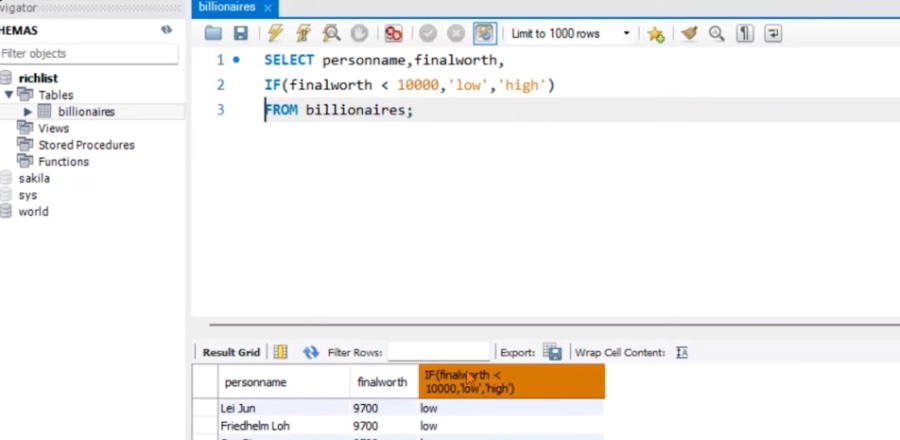Boost Your SQL Skills: Intermediate Guide (Part 2)
Master SQL with Joins, Subqueries & Regexp! Get 20% off our course with code SQL20. #SQLTutorial #LearnSQL
Key insights
- Learn advanced SQL techniques including REGEXP for sophisticated filtering.
- Master the use of IF & CASE statements to categorize data effectively.
- Understand how to perform complex data analysis with SUBQUERIES.
- Gain expertise on manipulating multiple datasets using JOINS.
- Work with a real dataset on billionaires to apply these concepts practically.
Exploring Intermediate SQL Concepts
SQL, or Structured Query Language, is a powerful tool that goes beyond basic data manipulation. At the intermediate level, understanding and applying advanced concepts like REGEXP, IF & CASE statements, SUBQUERIES, and JOINS can significantly elevate your data analysis skills. These techniques enable more complex queries, allowing for advanced filtering, category creation, in-depth analysis, and comprehensive data manipulation across multiple tables. When applied to real-world datasets, such as those concerning billionaires, these skills can uncover insights that are invaluable for businesses. This video tutorial serves as an essential bridge to mastering SQL for more sophisticated data tasks.

In the intermediate SQL tutorial video, part of a comprehensive SQL series, viewers gain insights into more complex aspects of SQL. This second installment covers essential concepts like REGEXP for advanced filtering, as well as IF & CASE statements for creating new categories within data sets. Additionally, it delves into SUBQUERIES for sophisticated data analysis and JOINS for integrating multiple tables effectively.
The tutorial is designed to build on the basics covered in the first part of the series, moving towards more intricate SQL features. Using a practical approach, the video employs real datasets, including an interesting project on billionaires, to demonstrate how these advanced SQL concepts can be applied in real-world scenarios. By working with multiple tables and utilizing the power of REGEXP, IF & CASE, subqueries, and joins, the tutorial ensures learners can handle more complex data challenges.
Importantly, the video is not only educational but also highly accessible, making it suitable for those looking to advance their SQL knowledge without being overwhelmed. This approachability is further enhanced by offering supportive materials such as free downloadable tables on geography and billionaires, which allow viewers to practice the skills discussed in the video. These resources are pivotal for anyone aspiring to master SQL for business analytics or data manipulation.
Apart from advanced SQL techniques, the video mentions additional courses available for learners who wish to dive deeper into related areas. These include Power BI for Business Analytics, The Complete Finance & Valuation Course, and Excel for Business & Finance Course. These courses are comprehensively designed to equip learners with not just SQL knowledge but a broad understanding of business analytics and finance tools.
Kenji Farré, the author and a recognized Microsoft Most Valuable Professional (MVP), presents the tutorial in a clear and engaging manner, encouraging learners to explore the full potential of SQL. His expertise adds significant value to the content, making complex concepts accessible to a wide audience. This intermediate SQL video stands out as a valuable resource for anyone looking to enhance their data manipulation and analysis skills.
People also ask
What is intermediate level of SQL?
At the intermediate level in SQL, one is expected to be proficient with Common Table Expressions (CTEs) and temporary tables, utilize window functions, manipulate strings with functions such as REPLACE, SUBSTRING, LEFT, RIGHT, and CHARINDEX, perform numeric calculations, manage NULL values using ISNULL, COALESCE, and NULLIF, convert data types with CAST and CONVERT, and leverage derived tables and subqueries effectively. This level indicates a deeper understanding of SQL beyond the basics.
How to practice intermediate SQL?
SQL Intermediate
What are the levels of SQL experience?
SQL expertise is commonly broken down into three levels: beginner, intermediate, and advanced. Beginners are acquainted with the fundamental syntax and commands such as SELECT, FROM, WHERE, and ORDER BY. As one progresses, the complexity of tasks and understanding increases, leading to intermediate and advanced stages of proficiency.
How can I be strong in SQL?
To excel in SQL, one should start by establishing a robust foundation in SQL principles. This includes gaining a comprehensive understanding of relational databases, data types, and the structure of SQL queries. Key SQL statements such as SELECT, INSERT, UPDATE, and DELETE should be mastered early on. From there, focus on writing efficient, effective queries to build upon this foundational knowledge.
Keywords
SQL tutorial, intermediate SQL, SQL series, learn SQL, SQL skills, advanced SQL techniques, SQL programming, database tutorial
